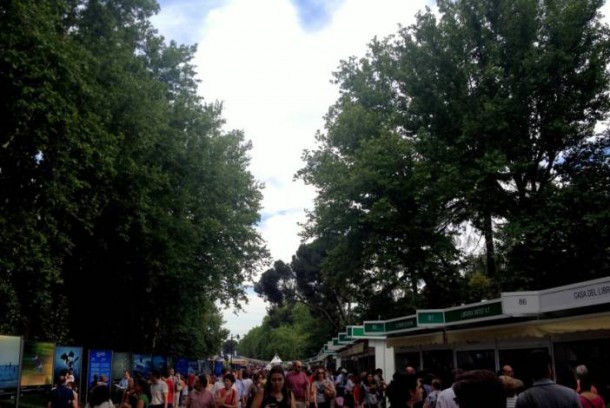MADRID, SPAIN. Dotted along the row of stalls at this year’s Fería del Libro is an assortment of foreign-language bookstores. From Dickens to Rowling and from Molière to Musso, it seems that you can find Europe’s best sellers and every genre of book under the sun in Madrid – but only if you know where to look.
Initially, as a language student and reading enthusiast, I found the measly handful of multi-lingual stalls amid the hundreds of Spanish retailers relatively disappointing. However, speaking to various book sellers it seems that this small community is steadily growing.
‘Pasajes’ is an international book store selling fiction and non-fiction in Spanish, French, English, German, Italian and many more languages. Their helpful assistant, Alba, assured me that multi-lingual bookstores are becoming more popular,
“More and more people are visiting shops like ours, because more people are learning foreign languages… Speaking other languages is extremely important and I think it’s a gift to be able to read a book in a different language, which hasn’t been translated into your native tongue. We also try to support people learning languages by providing lots of different material such as grammar books, even for people learning Spanish as well.”
Indeed, Europe grows more cosmopolitan each year thanks to the increase in compulsory language teaching and opportunities offered by institutions such as Erasmus and the Leonardo Programme, to name a few.
According to the European Commission Special Barometer on ‘Europeans and their Languages’, conducted in 2012, 54% of Europeans can hold a conversation in at least one other language and 44% are able to read a newspaper or magazine.
Jen, from ‘Alemana Auryn Librería’ pointed out that languages are also becoming more important for the job market. Over half (53%) of Europeans now use a foreign language at work and many companies insist that candidates are fluent in at least one foreign language. In times of economic downturn here in Spain, languages have become even more vital for young people in order to expand their potential job opportunities abroad.
Having said this, when questioned about their clientele, both booksellers implied that the majority of their customers were foreign people living in Madrid. Jen insisted that her customers are almost entirely Germans, or German speakers. Whilst we can assume that these ‘German speakers’ may well be foreigners who have learnt/are learning German as a second language, it seems undeniable that a large number of people visiting international book-stores are people searching for books in their native language.
So why is this? The answer is comfort. People like to read books in their own language because it is easy and leisurely. Even those who have learnt languages and enjoy the occasional challenge of deciphering an 18th century novel or even skimming through a chick lit in a different language, would 9 times out of 10 prefer to devour a book in their own language because it is natural and does not require the additional process of translation.
Fortunately for the handful of foreign bookstores here in Madrid, there are enough international students, expats and professionals to keep them in business. After all, we cannot forget that a large number of these people surely came to Madrid learn Spanish, even if their literary interest rarely extends beyond their native language.
What’s more, corporate giants like ‘Casa del Libro’ have not been responsible for a reduction in their profits. When asked if she thought that sales suffered due to larger companies, Jen replied:
“Not really. We have a bigger variety and more specific content. The people that work in our shop know much more about the material that we sell. In shops like ‘Casa del Libro’, it is harder to sell and recommend German books because the staff are not specialised in that area.”
Indeed, independent bookstores such as these offer advice on a much more intimate level. The owner knows what stock they have and where it has come from, and has more time to sit down and discuss different books with the customer.
Evidently, foreign- language book stores are thriving here in Madrid. Whilst we can celebrate the success of independently run stores over corporate giants, we should also strive to further promote these shops for the huge language benefit that they bring. Not only should these shops welcome the lost tourist or curious expat exploring the hidden corners of the city, but also the madrileños striving to perfect their English…or French… or German with a good, old fashioned book. The Fería del Libro is an excellent start, and I hope more young people have been inspired to pick up a foreign book.

